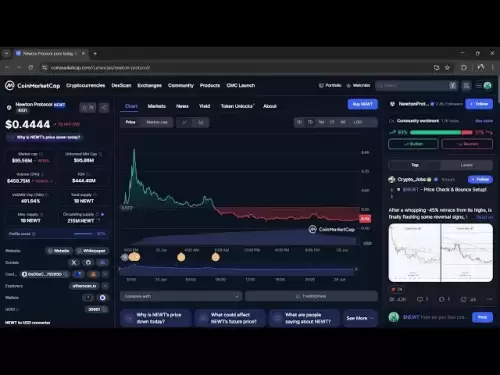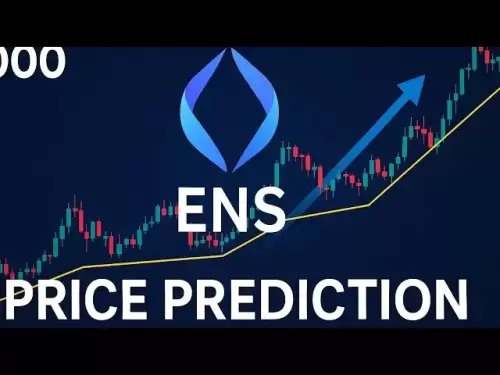-
 Bitcoin
Bitcoin $107,308.8133
-0.08% -
 Ethereum
Ethereum $2,425.9047
0.07% -
 Tether USDt
Tether USDt $1.0002
-0.01% -
 XRP
XRP $2.1169
-3.33% -
 BNB
BNB $646.5225
0.22% -
 Solana
Solana $142.1883
-1.36% -
 USDC
USDC $0.9999
0.00% -
 TRON
TRON $0.2714
-0.19% -
 Dogecoin
Dogecoin $0.1600
-3.36% -
 Cardano
Cardano $0.5545
-2.76% -
 Hyperliquid
Hyperliquid $36.5550
-1.44% -
 Bitcoin Cash
Bitcoin Cash $492.8443
1.79% -
 Sui
Sui $2.6160
-5.12% -
 Chainlink
Chainlink $13.0681
-0.80% -
 UNUS SED LEO
UNUS SED LEO $9.0028
-0.01% -
 Stellar
Stellar $0.2352
-2.94% -
 Avalanche
Avalanche $17.2295
-2.75% -
 Toncoin
Toncoin $2.8080
-1.23% -
 Shiba Inu
Shiba Inu $0.0...01122
-3.72% -
 Litecoin
Litecoin $84.5374
-0.16% -
 Hedera
Hedera $0.1433
-5.23% -
 Monero
Monero $315.9545
0.89% -
 Dai
Dai $0.9996
-0.03% -
 Ethena USDe
Ethena USDe $0.9997
-0.04% -
 Polkadot
Polkadot $3.2987
-2.83% -
 Bitget Token
Bitget Token $4.4729
2.88% -
 Uniswap
Uniswap $6.8093
-2.50% -
 Pi
Pi $0.5621
-11.98% -
 Pepe
Pepe $0.0...09222
-4.89% -
 Aave
Aave $252.2262
-2.43%
How about investing in Ripple?
Investing in Ripple involves understanding its technology, market performance, regulatory landscape, competition, and potential return on investment.
Jan 09, 2025 at 06:06 am

Investing in Ripple: A Comprehensive Guide
Key Points:
- Understanding Ripple's Technology and Ecosystem
- Analyzing Ripple's Market Performance
- Evaluating Ripple's Regulatory Landscape
- Assessing Ripple's Competition
- Exploring Investment Strategies for Ripple
Understanding Ripple's Technology and Ecosystem
Ripple is a blockchain-based enterprise software company that provides solutions for global financial transactions. Its flagship product, RippleNet, is a network of banks and financial institutions that use the XRP Ledger to facilitate fast, secure, and cost-effective cross-border payments.
- Ripple Consensus Algorithm: RippleNet uses a consensus algorithm called the Ripple Protocol Consensus Algorithm (RPCA), which enables secure and efficient validation of transactions without the need for miners. This results in faster transaction processing times compared to traditional blockchain networks like Bitcoin or Ethereum.
- XRP Ledger: The XRP Ledger is a distributed and open-source ledger that records and validates RippleNet transactions. It allows for the transfer of various currencies, including fiat currencies, commodities, and cryptocurrencies.
- XRP Token: XRP is the native cryptocurrency of the Ripple ecosystem. It is used for transaction fees, liquidity provision, and value transfer on RippleNet. XRP's supply is fixed at 100 billion tokens, with around 45% currently in circulation.
Analyzing Ripple's Market Performance
Ripple has experienced significant growth in its market valuation since its launch in 2012. XRP, the native cryptocurrency, has been among the top 10 cryptocurrencies by market capitalization for several years, reaching its peak valuation in early 2018 when it briefly surpassed Ethereum to become the second-largest cryptocurrency.
- Historical Market Trends: Ripple's market performance has been influenced by various factors, including regulatory developments, industry adoption, and overall market sentiment. After the 2018 market crash, XRP struggled to regain its previous highs for several years.
- Recent Market Developments: In recent months, Ripple has shown signs of recovery. The XRP token has outperformed the broader cryptocurrency market, fueled by positive developments within the Ripple ecosystem and broader macroeconomic factors.
Evaluating Ripple's Regulatory Landscape
The regulatory environment surrounding Ripple and XRP has been evolving, with different jurisdictions taking varying approaches. The U.S. Securities and Exchange Commission (SEC) filed a lawsuit against Ripple Labs in December 2020, alleging that Ripple and its executives sold XRP as an unregistered security.
- Current Regulatory Status: The SEC lawsuit is ongoing, and its outcome will significantly impact Ripple's future. A potential resolution could involve Ripple agreeing to register XRP as a security, potentially limiting its use and accessibility as a cryptocurrency.
- Global Regulatory Landscape: Other jurisdictions have not yet classified XRP as a security. However, the SEC lawsuit has raised questions about the regulatory status of XRP and other cryptocurrencies worldwide.
Assessing Ripple's Competition
Ripple faces competition from various players in the cross-border payment space, including traditional banks, established financial institutions, and other blockchain-based solutions. Understanding Ripple's competitive landscape is crucial for evaluating its investment potential.
- Traditional Banks: Traditional banks have been the primary providers of cross-border payments for decades. Ripple competes with banks by offering faster, cheaper, and more transparent services through its RippleNet network.
- FinTech Companies: Emerging fintech companies are also offering competitive cross-border payment solutions, leveraging technology to reduce fees and processing times. Ripple must differentiate itself from these platforms to maintain market share.
- Blockchain-Based Competitors: Other blockchain-based projects, such as Stellar Lumens and Hedera Hashgraph, provide similar cross-border payment services. Ripple must demonstrate its advantages over these competitors to attract users and partnerships.
Exploring Investment Strategies for Ripple
Investing in Ripple involves choosing a suitable investment strategy based on individual risk tolerance and investment goals. Various strategies exist, including direct investment in XRP, through Ripple-related stocks, or through specialized investment vehicles.
- Direct XRP Investment: Direct investment in XRP involves purchasing the cryptocurrency on cryptocurrency exchanges. This strategy offers the potential for capital appreciation if the value of XRP increases.
- Ripple-Related Stocks: Investors can also invest in companies that are directly involved with Ripple or its ecosystem. These may include companies like CrossRiver Bank, a partner of Ripple, or Coil, a platform that leverages Ripple's technology for content monetization.
- Specialized Investment Vehicles: Structured investment vehicles, such as funds or trusts dedicated to Ripple and XRP, offer alternative investment options for those seeking exposure to the Ripple ecosystem without directly purchasing XRP.
FAQs
Q: Is Ripple a good investment?
A: The investment potential of Ripple depends on various factors, including market conditions, regulatory developments, and competition. Careful research and analysis are essential before making investment decisions.
Q: Is XRP an alternative to Bitcoin?
A: While both Bitcoin and XRP are cryptocurrencies, they serve different purposes. Bitcoin is primarily used as a store of value, while XRP focuses on facilitating cross-border payments.
Q: Can Ripple recover from the SEC lawsuit?
Disclaimer:info@kdj.com
The information provided is not trading advice. kdj.com does not assume any responsibility for any investments made based on the information provided in this article. Cryptocurrencies are highly volatile and it is highly recommended that you invest with caution after thorough research!
If you believe that the content used on this website infringes your copyright, please contact us immediately (info@kdj.com) and we will delete it promptly.
- QFSCOIN: Your No-Sweat Ticket to Crypto Mining Riches (Bitcoin, Dogecoin, Litecoin)
- 2025-06-27 00:50:12
- Altcoins on the Radar: BlockDAG's Presale Surge, SHIB's Support Test, and the Meme Coin Shift
- 2025-06-27 01:10:11
- Moonveil's $MORE Token: Powering the Future of Web3 Gaming with CEX Listings
- 2025-06-27 00:30:12
- Wormhole Crypto: Navigating Interoperability, Crash Risks, and 10x Potential
- 2025-06-27 00:30:12
- Crypto, SOL Dev, Token Presale: Solana's Rise and the Neo Pepe Phenomenon
- 2025-06-27 01:27:14
- Dogecoin ETF Approval: Is the Meme Dream About to Become Reality?
- 2025-06-27 01:52:13
Related knowledge
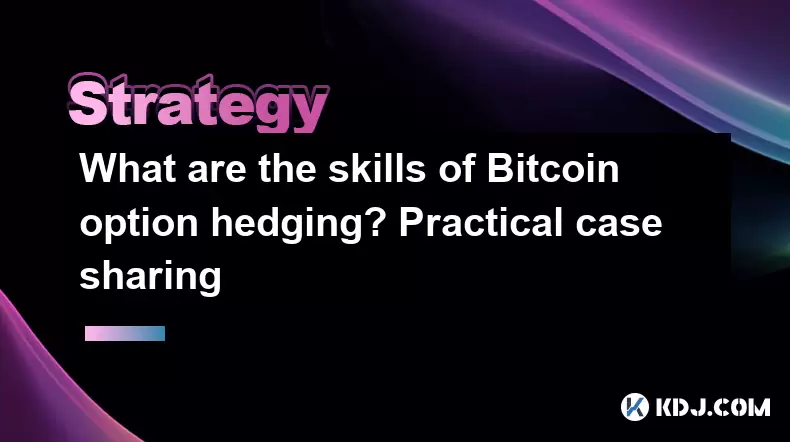
What are the skills of Bitcoin option hedging? Practical case sharing
Jun 24,2025 at 04:01pm
Understanding Bitcoin Option HedgingBitcoin option hedging is a risk management strategy used by traders and investors to protect their positions in the volatile cryptocurrency market. By using options, individuals can limit potential losses while retaining the opportunity for profit. In essence, it allows one to insulate against adverse price movements...
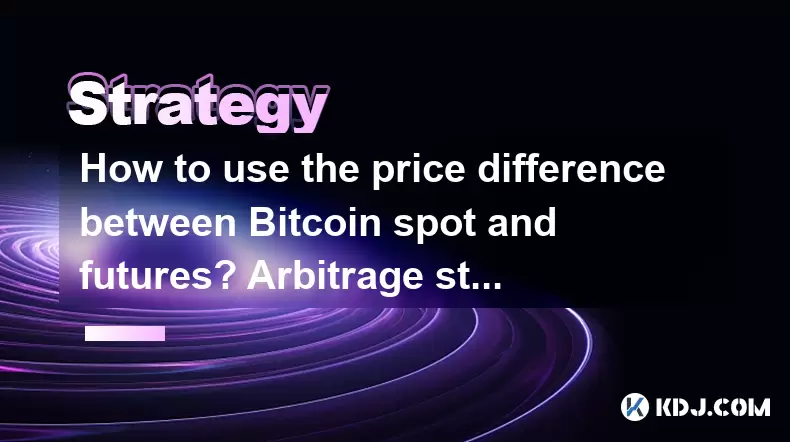
How to use the price difference between Bitcoin spot and futures? Arbitrage strategy
Jun 20,2025 at 02:56pm
Understanding Bitcoin Spot and Futures MarketsTo effectively leverage arbitrage opportunities between Bitcoin spot and futures markets, it's essential to understand the fundamental differences between these two types of markets. The spot market refers to the direct buying and selling of Bitcoin for immediate delivery at the current market price. In cont...
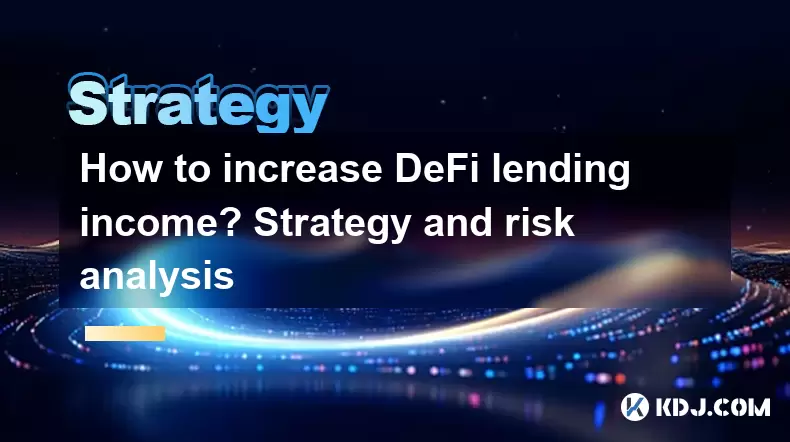
How to increase DeFi lending income? Strategy and risk analysis
Jun 24,2025 at 02:08pm
Understanding DeFi Lending and Its Income PotentialDeFi (Decentralized Finance) lending has emerged as a popular way to earn passive income in the cryptocurrency space. Unlike traditional banking systems, DeFi lending platforms allow users to lend their crypto assets directly to borrowers without intermediaries. The lenders earn interest based on the su...
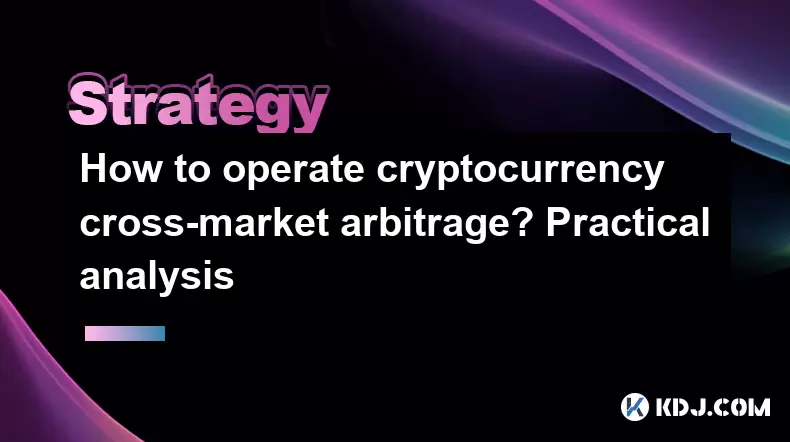
How to operate cryptocurrency cross-market arbitrage? Practical analysis
Jun 23,2025 at 04:01am
Understanding Cryptocurrency Cross-Market ArbitrageCryptocurrency cross-market arbitrage involves taking advantage of price differences for the same digital asset across different exchanges. The core idea is to buy low on one exchange and sell high on another, capturing the profit from the discrepancy. This strategy relies heavily on real-time market da...

How to make profits from high-frequency cryptocurrency trading? Sharing core skills
Jun 19,2025 at 05:07pm
Understanding High-Frequency Cryptocurrency TradingHigh-frequency trading (HFT) in the cryptocurrency market involves executing a large number of trades at extremely fast speeds, often within milliseconds. This method relies on small price discrepancies across exchanges or within a single exchange’s order book. Traders use complex algorithms and ultra-l...
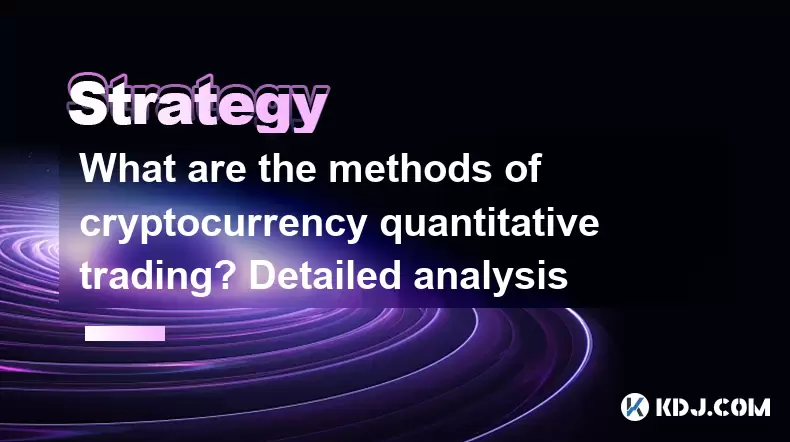
What are the methods of cryptocurrency quantitative trading? Detailed analysis
Jun 22,2025 at 11:07pm
Understanding the Core of Cryptocurrency Quantitative TradingCryptocurrency quantitative trading refers to the use of mathematical models and algorithms to execute trades in the digital asset market. Unlike traditional discretionary trading, which relies heavily on human judgment, quantitative trading leverages data-driven strategies to identify profita...

What are the skills of Bitcoin option hedging? Practical case sharing
Jun 24,2025 at 04:01pm
Understanding Bitcoin Option HedgingBitcoin option hedging is a risk management strategy used by traders and investors to protect their positions in the volatile cryptocurrency market. By using options, individuals can limit potential losses while retaining the opportunity for profit. In essence, it allows one to insulate against adverse price movements...

How to use the price difference between Bitcoin spot and futures? Arbitrage strategy
Jun 20,2025 at 02:56pm
Understanding Bitcoin Spot and Futures MarketsTo effectively leverage arbitrage opportunities between Bitcoin spot and futures markets, it's essential to understand the fundamental differences between these two types of markets. The spot market refers to the direct buying and selling of Bitcoin for immediate delivery at the current market price. In cont...

How to increase DeFi lending income? Strategy and risk analysis
Jun 24,2025 at 02:08pm
Understanding DeFi Lending and Its Income PotentialDeFi (Decentralized Finance) lending has emerged as a popular way to earn passive income in the cryptocurrency space. Unlike traditional banking systems, DeFi lending platforms allow users to lend their crypto assets directly to borrowers without intermediaries. The lenders earn interest based on the su...

How to operate cryptocurrency cross-market arbitrage? Practical analysis
Jun 23,2025 at 04:01am
Understanding Cryptocurrency Cross-Market ArbitrageCryptocurrency cross-market arbitrage involves taking advantage of price differences for the same digital asset across different exchanges. The core idea is to buy low on one exchange and sell high on another, capturing the profit from the discrepancy. This strategy relies heavily on real-time market da...

How to make profits from high-frequency cryptocurrency trading? Sharing core skills
Jun 19,2025 at 05:07pm
Understanding High-Frequency Cryptocurrency TradingHigh-frequency trading (HFT) in the cryptocurrency market involves executing a large number of trades at extremely fast speeds, often within milliseconds. This method relies on small price discrepancies across exchanges or within a single exchange’s order book. Traders use complex algorithms and ultra-l...

What are the methods of cryptocurrency quantitative trading? Detailed analysis
Jun 22,2025 at 11:07pm
Understanding the Core of Cryptocurrency Quantitative TradingCryptocurrency quantitative trading refers to the use of mathematical models and algorithms to execute trades in the digital asset market. Unlike traditional discretionary trading, which relies heavily on human judgment, quantitative trading leverages data-driven strategies to identify profita...
See all articles




















